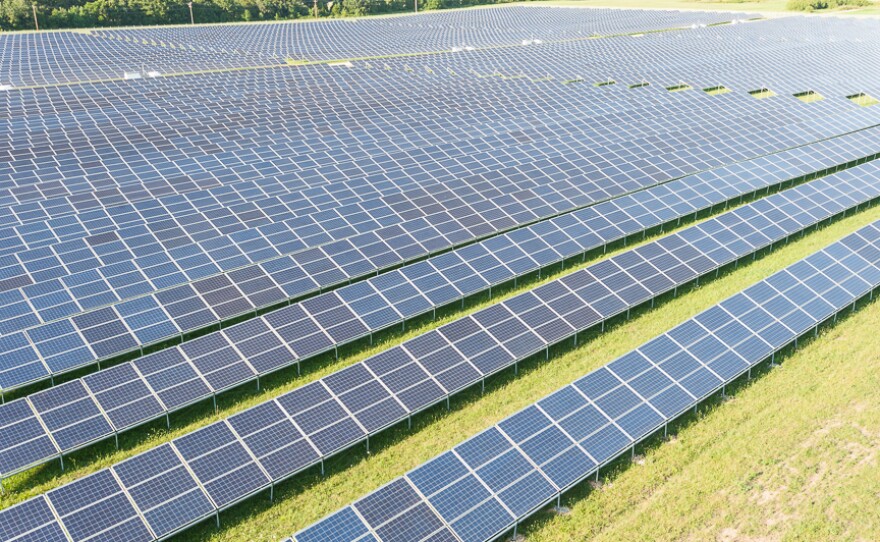Springfield citizens and businesses may soon have another renewal energy option. City Utilities on Friday held a dedication ceremony for a 40-acre solar farm northeast of Springfield that officials say can power approximately 900 homes each year. KSMU’s Scott Harvey has details.
The site, which was constructed and will be operated by North Carolina-based Strata Solar, consists of nearly 22,000 panels, making it the largest solar farm in Missouri. The project was developed by St. Louis-based Solexus Development. It is capable of producing 4.95 megawatts of energy.
The proposal awaits consideration by the Board of Public Utilities and Springfield City Council. If approved, those wanting to use solar under the voluntary solar rider program will pay a surcharge of 4.04 cents per kilowatt hour.
Scott Miller is the general manager of City Utilities.
“Right now our full cost in for a residential customer is right around 9 cents [per kilowatt hour]. With this [solar] if you sign up for it the total cost will be right around 13 cents,” Miller said.
Officials say the surcharge comes from the cost to produce solar, estimated at twice that of using coal and 1.5 times that of natural gas.
“The surcharge, if you will, it really consists of just a locked in adjustment factor. Just simply passes on that difference in cost. So our customers wind up paying exactly what the solar energy costs the utility,” Ross says.
CU Director of Pricing and Forecasting Ray Ross says the average residential customer in Springfield uses about 10,600 kilowatt hours per year. He says a one-kilowatt subscription (or block), which accounts for 20 percent of the average customer’s demand, would cost an additional $8 per month. To fulfill 100 percent demand, a six-kilowatt subscription would cost roughly an extra $45 per month.
Those rates have drawn criticism from members of the local Sierra Club, who told the City Utilities Citizens’ Advisory Council on Thursday that while the group supports the solar farm, it doesn’t agree with the assertion that solar energy is more expensive than coal.
Reached by phone Friday, Sierra Club member Myra Scroggs says we’re paying more for coal than it looks like.
“It’s not just the train load full of coal that you are buying. You are also having to remediate problems that it produces. And that’s not figured into the cost. You don’t have that with solar,” Scroggs said.
Scroggs added that the higher costs could present a false sense of demand for renewables.
“That may make it look like if people don’t sign up because of the costs that they’re really not interested in having solar power here. That may discourage City Utilities from moving to more solar in the future.”
Scott Miller says over time it’s possible that energy prices will increase, making renewable sources like solar less expensive. He says in the meantime, there are a variety of reasons why people would want to sign up.
“I think part of is what is your belief, how do you feel about it? Part of it is it might be a corporate goal. So there’s a variety of different motivations.”
Miller adds that with the high cost of installing solar panels on a home or business, CU is, with its new program, “trying to give a utility-scale price but allow everyone to incorporate into it.”
The solar energy rate would be locked in for 20 years. CU’s Ray Ross does note that base rates, however, will still be subject to change. Customers could opt out of the solar rider program after two years without paying a penalty. A $100 fee would apply to those who exit before that time.
CU has the option to purchase the solar system from Strata Solar after seven years.
The one-year signup period could begin as early as October 1, if the proposal is approved by the CU Board and City Council. Officials hope to start preliminary signups later this month through CU’s Energy Service and Renewable Office at 417-874-8200.




